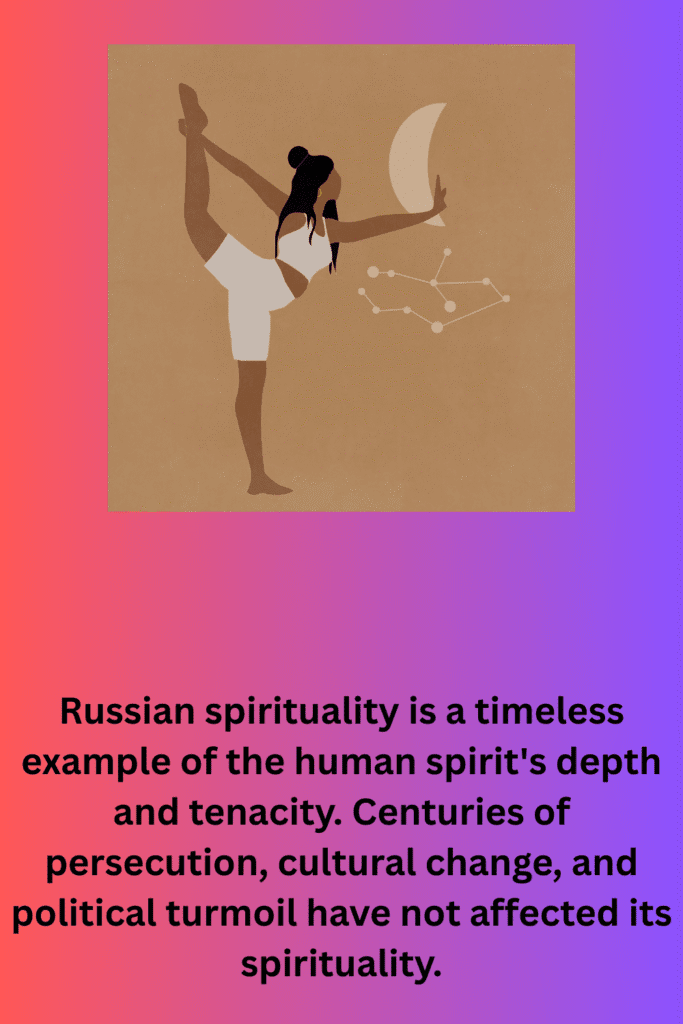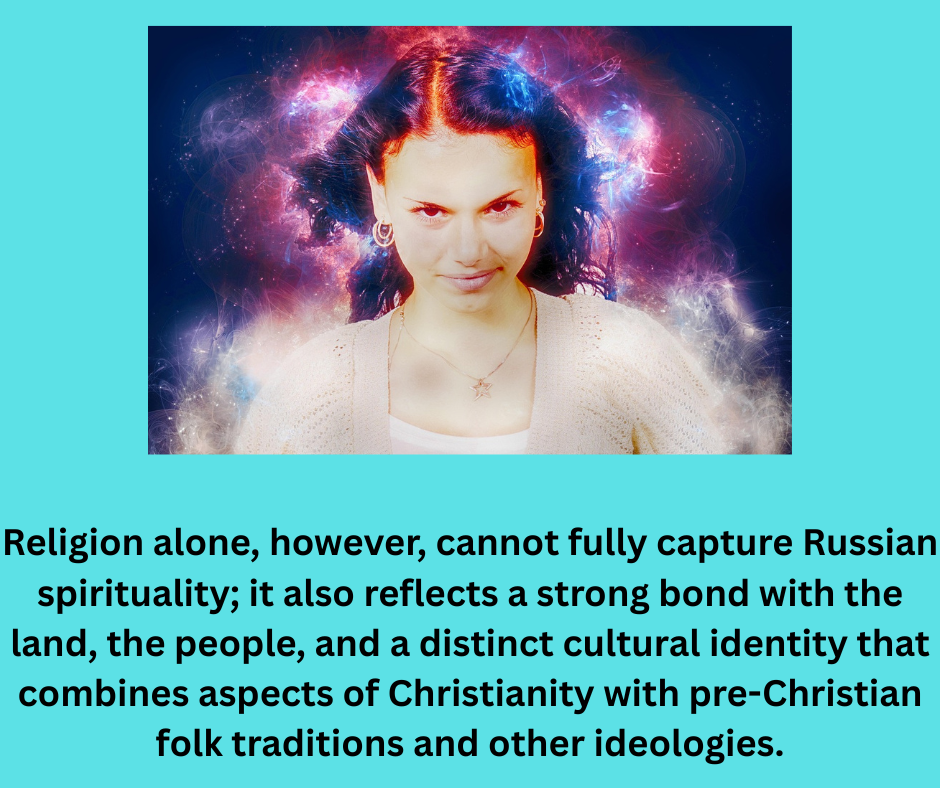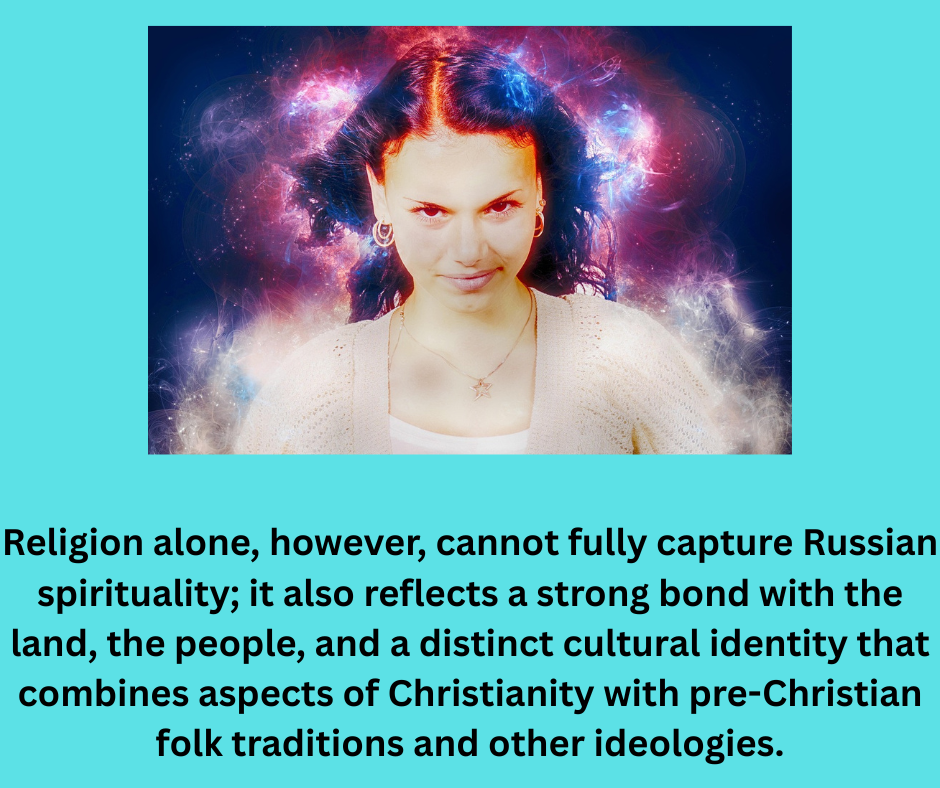Exploring Russian Spirituality:
A Deep Connection to Faith, Culture, and Tradition
opinion on Russian spirituality, Over the years, Russian spirituality has developed into a rich and varied tradition influenced by a wide range of historical, cultural, and religious factors. Russian spirituality is rooted in Eastern Orthodox Christianity and is characterized by a strong feeling of mysticism, devotion, and respect for the natural and supernatural realms. Religion alone, however, cannot fully capture Russian spirituality; it also reflects a strong bond with the land, the people, and a distinct cultural identity that combines aspects of Christianity with pre-Christian folk traditions and other ideologies.

Russian spirituality will be discussed in this article, along with its Eastern Orthodox origins, incorporation of indigenous ideas, and development in the contemporary world. Along with discussing the difficulties and timeless characteristics that characterize the Russian spiritual experience, I will also offer my thoughts on the place of spirituality in contemporary Russian society.
Table of Contents
The Foundations of Russian Spirituality:
The Eastern Orthodox Church
The Eastern Orthodox Church is closely associated with Russian spirituality and has been instrumental in forming the nation’s religious and cultural landscape. The official adoption of Christianity as the state religion by Prince Vladimir of Kiev in the tenth century marked the introduction of Christianity into Russia. opinion on Russian spirituality,The Byzantine Empire left behind a rich spiritual and theological heritage that emphasized abstinence, introspection, and the mystery of God in early Russian Christianity.
Spirituality and faith are inextricably linked for many Russians. In Russia, the Eastern Orthodox Church is regarded as a fundamental component of the nation’s identity and community, not just a place of prayer.
Rich in chanting, incense, and iconography, the church’s liturgical rituals foster an environment that encourages Christians to commune with God and transcend the material world. Russian Orthodox spirituality is centered on the celebration of holy days, the worship of saints, and a close relationship with the Virgin Mary.
The Russian people’s spiritual consciousness is greatly influenced by the Russian Orthodox Church and its longstanding traditions of prayer, mysticism, and monasticism. opinion on Russian spirituality,Russian spirituality frequently highlights the value of self-sacrifice, humility, and the necessity of purifying oneself via penance and prayer.
In Russian Orthodoxy, the concept of sobornost—or spiritual unity within the community—is equally essential. This idea implies that communal harmony and unity, in addition to individual commitment, are the keys to ultimate spiritual fulfillment.
The Mysticism and Asceticism of Russian Spirituality
Significantly, Russian spirituality is distinguished from other Christian traditions by its rich mystical components. Saint Sergius of Radonezh, St. Seraphim of Sarov, and the numerous Russian monastic saints who aspired to a life of austerity and oneness with God have all influenced Russian mysticism, opinion on Russian spirituality,which has its origins in the early Christian Desert Fathers.
A very intimate contact with God is highly valued in the Russian Orthodox Church and is frequently developed by prayer, fasting, and meditation.
Russian spiritual practice is based on the Jesus Prayer, a straightforward but effective prayer that invokes the name of Christ. In order to achieve the hesychastic condition of inner calm, or inner peace, which is regarded as a type of spiritual enlightenment, the believer can better focus their mind and spirit on God by repeating this prayer.
In spite of the fact that the road to redemption is sometimes paved with hardship and self-doubt, Russian spirituality urges people to seek their own salvation via prayer. opinion on Russian spirituality,Since the Russian people have endured many hardships throughout their history, including invasions and internal strife, the idea of enduring adversity for spiritual progress strikes a deep chord with them.
The Role of Folk Traditions and Indigenous Beliefs
Although Eastern Orthodoxy is most frequently linked to Russian spirituality, it is important to recognize the impact of indigenous beliefs and pre-Christian folk traditions that have endured alongside Christianity. Slavic peoples engaged in a type of animism prior to the widespread acceptance of Christianity, holding that spirits lived in objects such as stones, trees, and rivers.
Though in a more subdued form, this respect for the natural world and the paranormal still permeates Russian spirituality today.
Many regions of Russia still follow folk customs, such as holding festivals and rituals to commemorate the change of the seasons. opinion on Russian spirituality,Christian holidays frequently coexist peacefully with these traditions, which respect the natural cycles.
For instance, Maslenitsa, a pre-Christian festival that commemorates the end of winter and the start of spring, is now observed alongside Lent in the Christian calendar. The customs of divination, folk healing, and reverence for the soil are still prevalent, particularly in rural areas where generations-old knowledge is transmitted.
Furthermore, Russia’s longstanding ties to occultism, shamanism, and mysticism have fueled a spiritual climate that combines more esoteric ideas with traditional religious activities. In addition to Orthodox Christianity, these long-standing, native customs that continue to be a vital component of Russian culture also influence the mystical elements of Russian spirituality.
Soviet Atheism and the Revival of Spirituality
The spiritual landscape underwent a dramatic change with the advent of communism in Russia. The Russian Orthodox Church faced severe persecution under Soviet control, and atheism was propagated as the official state doctrine. Many clergy members were sent in jail or killed, churches were shut down, and religious instruction was outlawed. opinion on Russian spirituality,With a focus on materialism and atheism, the Soviet Union aimed to supplant religious devotion with Marxist-Leninist philosophy.
However, Russian spirituality did not entirely disappear despite Soviet tyranny. Subterranean churches and religious communities were established to preserve spiritual traditions, and many Russians continued to practice their faith covertly. Furthermore, the Russian people’s strong spiritual ties were never completely lost, and there was always hope that spirituality would eventually be revived.
The Eastern Orthodox Church in particular has seen a resurgence of interest in Russian spirituality after the collapse of the Soviet Union in 1991. In an attempt to feel more connected to their spiritual and cultural roots, millions of Russians have returned to the church, which has recovered its power.
Religion has once again emerged as a defining characteristic of Russian national identity in the modern era, as many people look for meaning and purpose in a world that has experienced swift political, social, and economic transformations.
Russian Spirituality in the Modern World
Russian spirituality is undergoing fresh changes and problems in the modern period. Globalization’s quick speed and the introduction of Western ideals have given Russian spiritual life both chances and challenges. On the one hand, more Russians are looking for other routes to spiritual fulfillment, including as yoga, meditation, and New Age practices, since there is a growing interest in spirituality outside of the conventional church environment.
However, for millions of people, Russian Orthodox Christianity continues to be a vital part of their spiritual and national identities. opinion on Russian spirituality,With President Vladimir Putin frequently highlighting the link between faith, tradition, and patriotism, the Russian government has placed a greater emphasis on Orthodoxy as a fundamental component of Russian culture in recent years.
Many Russians now feel more spiritually united and proud as a result of the public revival of Orthodox Christianity, especially in light of current geopolitical tensions and global concerns.

Meanwhile, many people’s lives are still greatly influenced by the profound mysticism that defines Russian spirituality. Russian spirituality provides a feeling of depth and significance that binds people to something more than themselves, whether via solitary prayer, participation in mystical traditions, or experience with the Orthodox liturgy. Throughout Russia’s history, from the Mongol invasions to the Soviet era, hardships have molded a strong spiritual consciousness that endures and gives strength and comfort to those who seek it.
Conclusion:
A Rich Tapestry of Faith and Tradition
I believe that Russian spirituality is a timeless example of the human spirit’s depth and tenacity. Centuries of persecution, cultural change, and political turmoil have not affected its spirituality. opinion on Russian spirituality,It is a profoundly mystical, austere, and contemplative spirituality with roots in the Eastern Orthodox tradition that aims to develop an individual relationship with God.
However, it is also a spirituality that recognizes the value of community, the natural world, and the knowledge of the ancestors.
With its rich tapestry of faith, culture, and history, Russian spirituality continues to be a lively and essential component of the Russian character despite the difficulties posed by modernity and atheism. Spirituality is a genuine, breathing aspect of many Russians’ daily lives, offering them solace, direction, and purpose in a world that is changing quickly.
Russian spirituality still inspires and upholds the Russian people, whether it is via the mystical activities of saints and ascetics, the wisdom of ancient folk traditions, or the beauty of Orthodox liturgy.
